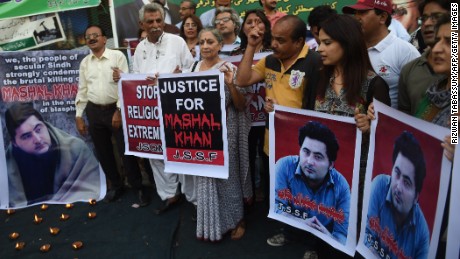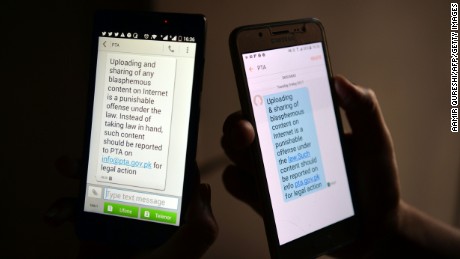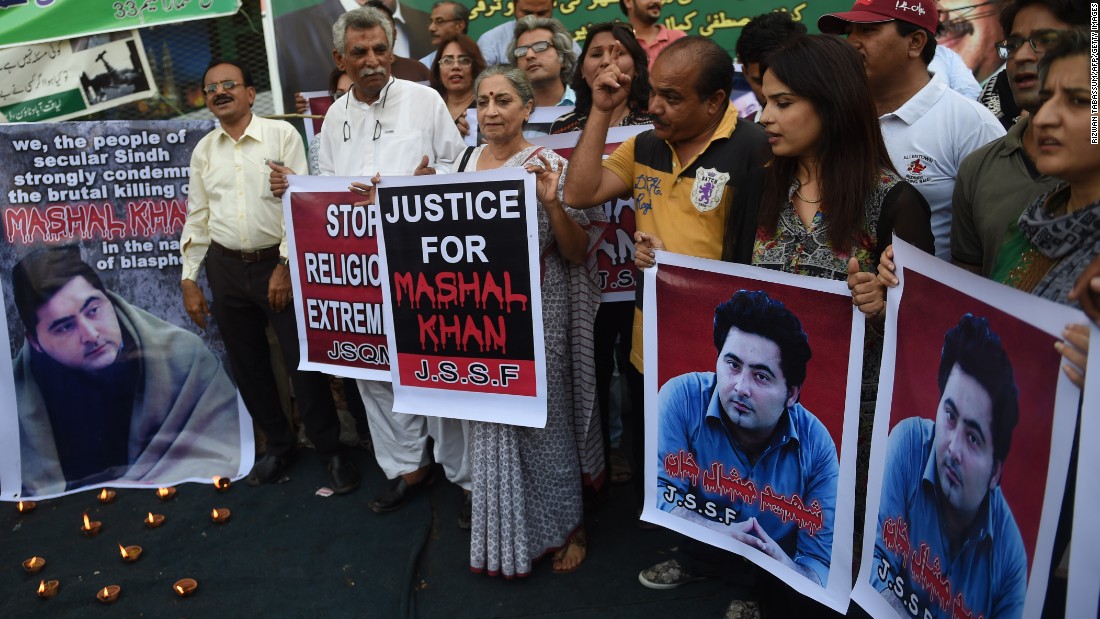Government passes death sentence on Facebook user over series of anti-government posts.

A Pakistan government crackdown on freedom of speech online has reached worrying new levels, activists say, after a young man was sentenced to death over a series of Facebook posts.
On Saturday, 30-year-old Taimoor Raza became the first person to receive a death sentence in a Pakistan anti-terrorism court for "using derogatory remarks ... in respect of the Holy Prophet" on social media.
Amnesty International's Pakistan campaigner, Nadia Rahman, said in a statement the conviction set a "dangerous precedent."
"No one one should be hauled before an anti-terrorism court or any other court solely for peacefully exercising their rights to freedom of expression and freedom of thought, conscience, religion or belief online," she said.
Human rights advocates said 2017 has seen an unprecedented crackdown by the government on Pakistanis' freedom of speech on the internet and in social media.
In January, the government shut down the websites and blogs of four online activists who regularly campaigned for humans rights and religious freedom, according to Human Rights Watch, right after they were went missing simultaneously.
They were later released. There is no proven involvement of the government in their abductions.
Pakistani demonstrators take part in a protest the killing of journalism student Mashal Khan in Karachi on April 22.
Pakistan Interior Minister Chaudhry Nisar Ali Khan said in March "nothing can be greater than our religion to us" in stopping blasphemy on the internet.
"If social media platforms do not cooperate with us despite all our efforts, then we will take the strictest of measures against such platforms in the country," he said.
In May, the Pakistan Telecommunication Authority sent millions of citizens a text message warning them against sharing blasphemy online.
"The uploading and sharing of blasphemous content on the internet is a punishable action under the law. Such content should be reported for legal action," the alert said.
Usama Khilji, director of the freedom of speech NGO Bolo Bhi, told CNN asking citizens to report each others actions online encouraged "mob justice."
"Asking people to record cases of blasphemy online (means) the state's responsibility is being transferred onto citizens," he said.
Laws 'open to abuse'
It isn't just the freedom of speech laws in the spotlight after the Facebook ruling -- blasphemy laws in Pakistan have long been controversial, including a mandatory death sentence for insulting the Prophet Muhammad.
A 2016 report by Amnesty International found the laws are "open to abuse" and anyone who is accused is usually presumed to be guilty, leaving them open to mob retribution.
There were 91 blasphemy cases concerning the Prophet or his companions registered between 2011 and 2015, the report said.
Specific blasphemy laws which punished perceived insults to Islam were introduced between 1980 and 1986, during a period of martial law under the military government of General Zia-ul-Haq. They were never removed once martial law ended.

Pakistani cellphone users reads a text message circulated by the Pakistan Telecommunication Authority on May 10.
The laws have been recently extended to acts committed on the Internet and social media. In March, three people were arrested for posting allegedly blasphemous content online.
No one has ever been executed under the law, but in the past year violent public responses to accusations of blasphemy have raised further concerns from activists.
In April, a young man was brutally beaten to death by his fellow students at a university in Mardan, after being accused of blasphemy on campus. Fifty-seven people were arrested after the lynching. The man himself was later acquitted by authorities two months after he was killed.
In her statement, Rahman said the government should instead be holding to account those who have lynched alleged blasphemers rather than arresting young men accused online.
'Miscarriage of justice'
Prosecutor Shafique Qureshi told CNN Taimoor Raza was accused of regularly sharing "blasphemous pictures and status updates" on his Facebook page, which criticized the companions of the prophet and the prophet himself.
Raza was arrested on 5 April at a bus stop where he was listening loudly to blasphemous content on his phone, according to Qureshi.
The images were found on his phone and his Facebook page and were examined by Islamic studies professors and found to be blasphemous. Raza is now being held in a so-called high treason jail in Sialkot.
But Raza's lawyer Fida Hussain Rana said his client was innocent and had been set up on social media.
"Two individuals ... instigated Taimoor on Facebook Chat to get him to say things against the Prophet Muhammad. Taimoor never said anything blasphemous," he said in a statement.
Rana said the trial was a "miscarriage of justice" and that there would be an appeal within two days.
A spokesman for Facebook said in a statement the social media site was "deeply saddened and concerned" by the sentence. "We do not provide any government with direct access to people's data," he said.
CNN's Spencer Feingold and Zahra Ullah contributed to this report.
Culled from CNN
Labels: news



0 Comments:
Post a Comment
Subscribe to Post Comments [Atom]
<< Home